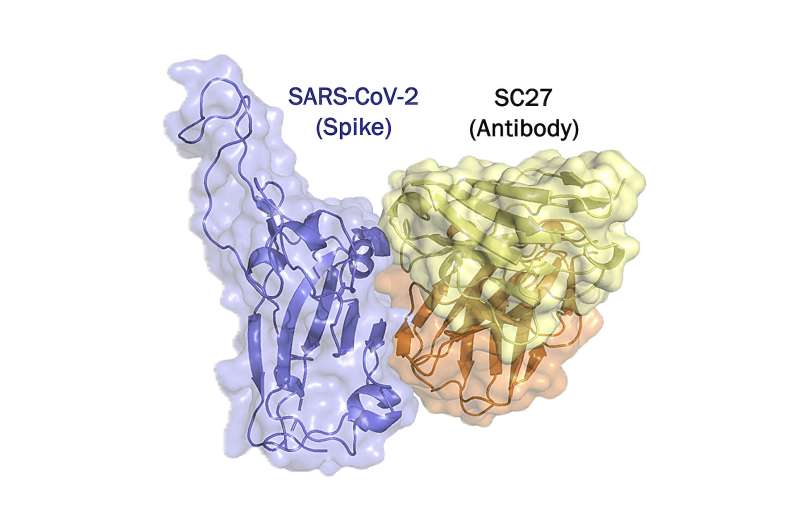This article has been reviewed according to Science X's editorial process and policies. Editors have highlighted the following attributes while ensuring the content's credibility:
fact-checked
peer-reviewed publication
trusted source
proofread
Monoclonal antibody neutralizes numerous COVID-19 variants

A monoclonal antibody appears effective at neutralizing the numerous variants of SARS-CoV-2, as well as related viruses in animals that could pose a threat if they were to begin spreading in people. The antibody, called SC27, was recently described in an article published in Cell Reports Medicine.
The finding opens the possibility of broader, more effective treatments to work against current and future COVID variants.
Monoclonal antibody SC27 was identified, developed and provisionally patented by a team of researchers led by Greg Ippolito, Ph.D., who recently joined Texas Biomedical Research Institute (Texas Biomed) from University of Texas at Austin. Other team leaders included Jason Lavinder, Ph.D., at UT and Ralph Baric, Ph.D., at University of North Carolina at Chapel Hill.
"Other COVID-19 antibodies have been rendered ineffective as SARS-CoV-2 has evolved over the past several years," says Dr. Ippolito, an Associate Professor. "Our new study suggests the virus is less likely to escape this treatment because SC27 targets and attaches to multiple parts of the virus's spike protein, including sections that are not mutating as frequently."
SC27 appears to work in two ways: it blocks the ACE2 binding site, which the virus uses to bind to, enter and infect cells. It also binds to a hidden or "cryptic" site on the underside of the spike protein that is largely unchanged or "conserved" between variants, which means SC27 can broadly recognize variants and related viruses.
This is critical because if an antibody's shape does not match enough with a virus—like two puzzle pieces that don't quite fit—the antibody can't effectively neutralize the virus and the virus sneaks by the body's immune defense system.
The researchers tested SC27 against 12 viruses, from the original SARS-CoV-2 to currently circulating variants, as well as related SARS-1 and several other coronaviruses found in bats and pangolins. The antibody was effective against all of them in a petri dish and protected mice against both variants tested.
"This makes it broader and more effective than any other monoclonal antibody reported in scientific literature to date and the former FDA-approved cocktails," says Dr. Ippolito, adding the caveat that SC27 still needs to be tested in human clinical trials.
The team is looking to collaborate with industry to further develop the SC27 monoclonal antibody treatment, which could potentially benefit immunocompromised patients who are unable to get vaccines. It also could serve as an emergency treatment during future outbreaks of new variants or coronaviruses.
Next steps would include preclinical studies in larger animal models, including nonhuman primates, which are the gold standard to evaluate how complete immune systems respond to a treatment before safely moving to human clinical trials.
Notably, SC27 was found in individuals following vaccination with mRNA COVID-19 vaccines. Previously, this type of "class 1/4" antibody—which attaches to two distinct areas or "epitopes" of the spike protein—was only detected following natural infection from SARS-1.
"This is fantastic news that vaccines can prompt the generation of these more robust and effective antibodies," explains Dr. Ippolito. "It means that future vaccine development can be tailored to generate these antibodies and have a clear metric for measuring which vaccines will be most effective."
More information: William N. Voss et al, Hybrid immunity to SARS-CoV-2 arises from serological recall of IgG antibodies distinctly imprinted by infection or vaccination, Cell Reports Medicine (2024). DOI: 10.1016/j.xcrm.2024.101668
Journal information: Cell Reports Medicine
Provided by Texas Biomedical Research Institute

















